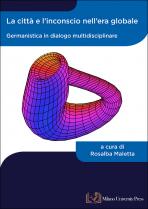La città e l'inconscio nell'era globale. Germanistica in dialogo interdisciplinare
Synopsis
The City and the Unconscious in the Global Age. German Studies in Multidisciplinary Dialogue hosts many more questions than it is possible to state here and seeks answers that introduce an ethic of citizenship for the third millennium, where the goals of Agenda 2030 are not reduced to slogans and empty talks and where the grassroots activists do not risk to be hushed up or even taken in by the most powerful corporations, which pretend to operate in the acknowledgment of the differences that Otherness entails. The inspirers of the volume are German-speaking intellectuals, poets, artists, architects from various backgrounds. In particular, we started from the ideas and work of Bruno Taut to rethink through Sigmund Freud, F. G. Jünger, Paul Celan, Durs Grünbein and many others social bonding in the age of anthropological mutation and pandemic emergencies.
________________________________________________
Chapters
-
Introduzione
-
L’inconscio al plurale: le città come modelli dello psichico
-
L’inconscio sociale e la dimensione urbana. Utopia, immaginario e temporalità dell’idea di città nell’adesso pandemico
-
Per un’architettura del Mitfühlen. La città tra emozione e relazione dalla 4E Cognition allo Sturm und Drang
-
L’Agenda 2030 di Bruno Taut. Le leggi dell’universo negli scritti nipponici
-
In cerca di una forma: Mosca negli anni Venti
-
Immagini urbane nella lirica di Ernst Stadler
-
Il malefico sortilegio del vintage. Nell'antiutopia di Die andere Seite di Kubin
-
Città, tecnica, natura. Riflessioni sull’opera di Friedrich Georg Jünger
-
In vece del bianco. Vicissitudini dell’irrappresentabile tra Alpine Architektur di Bruno Taut e Schneepart di Paul Celan
-
La città di Durs Grünbein «dopo l’ultima pioggia». Un tributo a Max Ernst
Downloads


This work is licensed under a Creative Commons Attribution-ShareAlike 4.0 International License.
